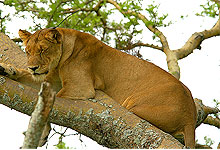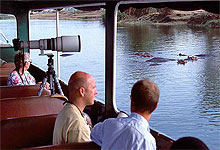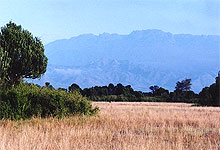Queen
Elizabeth National Park —
Uganda
(Queen
Elizabeth National Park Uganda
is located in western Uganda, spanning the districts
of Kasese, Kamwenge, Bushenyi and Rukungiri. Its location
is approximately 376 kilometers (234 miles), by road,
southwest of Kampala, Uganda's capital and largest
city. The town of Kasese lies just outside the northeastern
edge of Queen Elizabeth National Park, while the town
of Bushenyi, is situated just outside the park's southeastern
boundaries)
 Queen
Elizabeth National Park Queen
Elizabeth National Park |

Queen
Elizabeth National Park
|

Queen Elizabeth National Park
|
Queen
Elizabeth National Park Uganda
Queen
Elizabeth National Park Uganda
View Rates, Discounted
Prices - Book & Save Now!
Queen
Elizabeth National Park Uganda is a notable
Uganda safari destination for wildlife tours, chimpanzee
tracking adventures, birding safaris etc.
The
1978 square Kilometers Queen Elizabeth National Park
enjoys a stunning location on the rift valley floor
between Lakes Edward and George where a mosaic of
habitats supports 95 mammal species and a remarkable
612 species of birds.
Forty
years ago, Douglas Willocks described the diverse
features that led to its creation in 1952. There still
exists no better introduction or a more enticing invitation
to visit the park.
'Scenically
the area had everything. Thirty miles to the north,
the blue Rwenzori exploded from the plain, a composite,
jagged mass of mountains, sixty miles long and forty
wide and looking in certain lights as if you could
reach out and touch them.
Across
Lake Edward to the west, the Mitumbe hills stood sentinel
on the Congo, blue too in the long sight but in the
closer green, wooded, precipitous, unfriendly and
epitomizing darkest Africa. The eastern boundary of
this possible park was marked by the calm green escarpment
of the western Rift Valley.
And
between all the hills, mountains and lakes was endless
savanna, its constantly repeated motif the branched
cactus arms of the candelabra euphorbia tree.'
2 Days/ 1 Night Queen Elizabeth National
Park Safari |
|
Queen
Elizabeth National Park, Uganda Accommodation |
|
Click Here |
Animals
& Birds of Queen Elizabeth National Park Uganda
Queen
Elizabeth National Park
Uganda is
home to 95 mammal species while the bird list is 612
species long. This diversity is the result of an impressive
range of habitats.
Fifty-seven
vegetation types have been identified though these
can be summarized as just five: forest; grassland;
bushy grassland; Acacia woodland and lakeshore/ swamp
vegetation.
Residents
of the park's grasslands include elephant, Cape buffalo,
Uganda kob, waterbuck, warthog, giant forest hog,
lion, leopard and hyena. Topi are found in Ishasha,
while forest primates are found in Kyambura Gorge
and Maramagambo Forest.
Queen
Elizabeth National Park Uganda
has
an impressive bird list exceeded only by the neighboring
(and far larger) Virunga National Park.
Key
bird species include martial eagle, black-rumped buttonquail,
African skimmer, Chapin's flycatcher, pink-backed
pelicans, white-winged warbler, papyrus gonolek, papyrus
canary, corncrake, lesser and greater flamingo, and
shoebill stork.
Queen
Elizabeth National Park Uganda Highlights
Dry Season
June
to September is the driest time when most animals
remain near water, but be prepared for afternoon thunderstorms
at any time. The hot dry time is January to February
and is a good time to visit. Dry season temperatures
average 80°F (25°C).'
Rainy Season
It
rains anytime from October to December and March to
May when many roads become impassible.
Highlights
of Queen Elizabeth National Park Uganda
*
Sunset over the water
*
Boat ride on the Kazinga Channel
*
Beautifully positioned safari lodges
*
Chimpanzees in Kyambura (Chambura) Gorge
* Warthogs and hippos mowing the lawn at Mweya Lodge
Queen
Elizabeth National Park Uganda Facts
*
The park covers 770 miles ² (1995 km²).
* Road access from Uganda's capital city of Kampala
is 206 miles (420km).
* There is a landing strip at Mweya lodge for light
aircraft or a larger airstrip at Kasese town.
Mweya
Peninsula
The peninsula is the hub for tourism
activity and accommodation in the central section
of the park. A nature walk with a ranger guide enables
you to explore remoter parts of the peninsula.
Kazinga
Channel
The 40km-long channel that connects
Lake George to Lake Edward provides the park's prime
wildlife spectacle. Its shoreline attracts large
numbers of birds, mammals and reptiles year round.
These
can be seen from two covered launches, Topi and
Simba, that cruise between Mweya Jetty and the channel's
entrance into Lake Edward. The launches run at 15.00
and 17.00. Additional voyages run at 11.00 and 13.00
subject to demand.
North
Kazinga and Kasenyi
The plain north of the Kazinga Channel
is the primary game viewing area. A network of tracks
enables you to find elephant, buffalo and other
animals in the mosaic of grassland thickets that
covers the North Kazinga area near Mweya.
However
lion are most reliably sighted on the open Kasenyi
plain east of the Kasese road where they prey on
a large population of Uganda kobo. The Game Drives
are most rewarding in early morning and late afternoon.
A Ranger Guide is recommended to help enhance the
experience.
Katwe
Salt Lake
Whilst in the Queen Elizabeth area,
you can visit one of the oldest industries in Uganda
at the enclave of Lake Katwe town. Since the 14th
century salt has been mined by traditional methods
and is still in use today. Salt production peaks
during the dry season.
Katwe
Explosion Craters
This cluster of extinct volcanoes
north of Mweya Safari I can be explored by the winding
27km Crater Drive be the Main and Equator Gates.
This provides superb views of numerous craters,
some filled by lovely lakes, as well as to the Rwenzori
and across the rift valley floor.
Ishasha
- Tree Climbing Lions
Ishasha 100km south of Mweya, the
park's remote southern provides a true wilderness
experience. Diverse habitat including the Ishasha
River, savanna woodland, and Lake Edward Flats support
a variety of wildlife including, famous tree climbing
lions, and the rare shoebill stork.
Kyambura
Wildlife Reserve
This area, which protects the south-eastern
banks (Kazinga Channel, contains four crater lakes,
in which numbers of flamingos periodically congregate.
